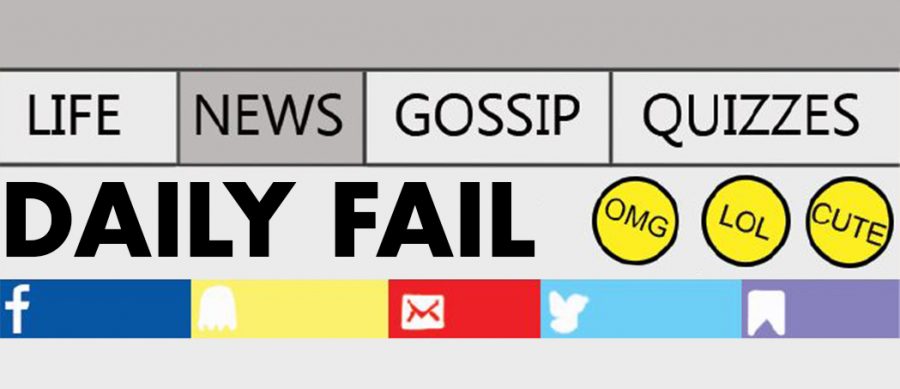Coco Kaleel ’20 sighed when she heard her morning alarm go off on her nightstand. She rolled over on her side, picked up her phone and opened up Daily Mail on the Snapchat Discover Page. Kaleel tapped through the updates on the latest celebrity scandal or political controversy that popped up at the top of her newsfeed.
“I just need a break and then I end up tapping,” Kaleel said. “It is a break, a distraction. It is so digestible, you can just tap through in five minutes or even less and read all the headlines.”
Kaleel said that the accessibility of social media platforms, such as Facebook, Snapchat and Twitter, has made them the primary way that students stay informed about current events. Checking the news on social media is an increasing phenomenon that extends beyond Harvard- Westlake. According to the Pew Research Center, in 2018, 68 percent of American adults said they at least occasionally get their news from social media. Social media sites have also surpassed print newspapers as a news source for Americans, according to Pew Research Center.
Alex Daum ’20 said he checks the Apple News app daily for top stories of the day. Daum enjoys reading the news on social media as a way to stay up to date about interesting topics, he said.
“The simplest way to stay up to date is just to check my phone when I am bored to look for stories that interest me,” Daum said. “Even if it is not big news, I look for stories that interest me, and that is how I stay informed.”
History teacher Dave Waterhouse said that students are more in touch with current events because of access to social media but do not spend much time understanding the material they are reading in depth.
“[Students] know a little bit about more things, but they do not know a lot about much of anything,” Waterhouse said. “They know a little bit about more because they can get these flashes all the time, but as far as the in-depth understanding of those things, I think it is probably in decline.”
Though Kaleel said that she does not think that news stories on social media are the most reliable, the headlines and articles are short and digestible, making it easy for students to stay up to date on current events even if they do not get the most accurate portrayal of the news.
“A lot of those headlines are made to catch your eye, and they profit off of the views because they have ads in their articles, so I would not trust Daily Mail to be the most accurate representation of American politics,” Kaleel said. “So, if it is a really serious story, I would probably follow up with the Wall Street Journal or something else. But, if you are trying to get a general picture of what’s happening, I think Snapchat Discover is adequate. If I did not have that, I probably would not be up to date on what is happening.”
Waterhouse said that getting the news in this short form can be problematic and deceptive.
“It is kind of dangerous,” Waterhouse said. “Getting that superficial up-to-the-minute information doesn’t give the full picture. Sometimes the initial headline doesn’t exactly get the story right. It gives it in a distorted way.”
Vishal Prashant ’20 said that with increased accessibility to news, it is important for students to be sure that what they are reading is accurate.
“If I read something on a social media article and I want to know if it was fake or not, I would probably look up the same topic on a reliable source online,” Prashant said. “I think reading social media news is fine for entertainment, but I do not think you should ever completely trust it without confirming from other sources.”
Monica Martell ’20 said that although the appeal of social media is the ability to get information immediately, often times she waits before believing the information presented. She said that this is the best way to allow for other sources to do more in-depth research and reporting on the topic.
“You do not have to discredit the information immediately,” Martell said. “People are always cautious about what they are reading, and if there are lies and not facts in the story, it usually comes to light. Holding on to information instead of immediately reacting to it could give stories the time they need to be discredited or confirmed.”
Skylar Graham ’20 said that she tries to read the newspaper that comes to her doorstep twice a week and check her Discover page on Snapchat daily. Graham said that it is easy for students to stay up to date on the news because of how widely accessible social media is, but oftentimes, students are not driven to check it on a regular basis.
“I have a phone and I could be up to date if I wanted to,” Graham said. “Is the motivation there? Not necessarily. It is definitely at our hands, but I do not think we are motivated to go out and find it.”
Kaleel said that people check the news more frequently when there is a big event, but sometimes current events can be overwhelming. She said she uses celebrity gossip as an escape from serious news.
“We have the most access to the world than we have ever had, and you are able to see what is more wrong about the world than you did before,” Kaleel said. “Celebrity news is a valuable escape, even if it doesn’t really matter because, with such high information access, you need a happy thing once in a while.”
Graham said that sometimes social media over-emphasizes celebrity gossip, sidelining other important topics. She said she wishes there was a better balance between the two types of articles.
“There are other topics that should be part of the conversation,” Graham said. “When regular people are suffering, it does not always get on the front page. But as soon as the celebrity has an issue, it’s life-changing and everyone is talking about it. People are losing their lives every day. Sometimes, celebrities need to take a backseat so we can have real conversations.”




























